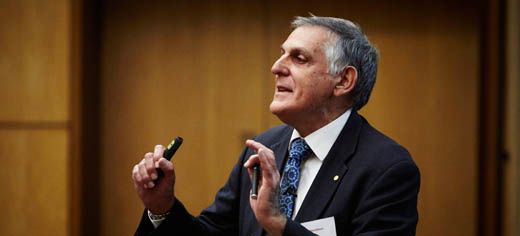
Professor Dan Shechtman celebrated crystallography's profound impact on modern science in the Bragg Centenary Lecture 2013 - and explained how he overturned one of the discipline's key principles.
Professor Shechtman, winner of the Nobel Prize in Chemistry in 2011, spoke in the University’s Rupert Beckett Lecture Theatre on November 21 at the culmination of a year of events marking the centenary of the development of X-ray crystallography by William Henry Bragg and William Lawrence Bragg at Leeds in 1912-13.
He told an audience including academics from across the country, representatives of industry as well as staff and students of the University about his fight to prove the existence of “quasi-periodic” crystals in the face of sometimes aggressive criticism from senior figures in the scientific establishment.
Quasi-periodic crystals violate the principle that all crystals have ordered and periodic structures. Some established chemists, including the two-times Nobel laureate Linus Pauling, refused to believe in their existence following Shechtman’s discovery in 1982.
“[Professor Pauling] was saying Danny Shechtman is talking nonsense, there are no quasi-crystals, just quasi-scientists,” Professor Shechtman said. During what he described as “years of rejection,” he was ejected from one research group because the leader said he was a disgrace and his promotion to professor was actively obstructed.
But Professor Shechtman said tenacity had paid in the end. He told researchers in the audience: “If you find something strange and interesting, bite like a Rottweiler dog. Don’t let go until you find out what it is.”
Professor Shechtman’s discovery was controversial because the ordered structure of crystals forms the basis of X-ray crystallography, allowing scientists to discover the atomic structure of materials by observing patterns of the diffraction of X-rays fired through a crystalline material. The X-ray crystallography technique developed by the Braggs at Leeds was one of the most important scientific breakthroughs of the 20th Century, associated with 28 subsequent Nobel prize winning discoveries including Watson and Crick’s discovery of the structure of DNA.
Professor Shechtman demonstrated that crystals existed that had a structure that was not “periodic”, meaning their pattern was ordered but not repeated. His persistence eventually won him the Nobel Prize in Chemistry and has established the study of quasi-periodic materials as an exciting interdisciplinary science.
The audience for the centenary lecture included senior figures from academia and industry.
Professor Trevor Rayment, Director of Physical Sciences at the Diamond Light Source, the UK's national synchrotron facility, said: “The Braggs’ work revealed a completely new world for scientists to explore. At that time, we knew that atoms and molecules existed, but for the first time, we could measure and picture their size and position. This work opened the door to everything from understanding the structure of DNA to the materials our spectacles are made from. In a similar way, Professor Shechtman took one of the ‘rules’ that we rested upon and showed us that the physical world could be so much richer if we threw it away. His work has uncovered a completely new class of materials.”
Sir Alan Langlands, Vice-Chancellor of the University of Leeds, said: “Professor Shechtman embodies the spirit of discovery of the pioneering William Henry Bragg and William Lawrence Bragg. His discovery, like that of the Braggs, changed fundamentally our understanding of the structure of materials and we are delighted that he accepted the invitation to deliver the Bragg Centenary Lecture.”
Professor Shechtman was born in 1941 and gained a BSc in mechanical engineering in 1966 at The Technion-Israel Institute of Technology in Haifa, Israel. He took a Ph.D in materials engineering at The Technion in 1972. He is the Philip Tobias Professor of Materials Science at The Technion and Professor of Materials Science at Iowa State University.
Further information
Chris Bunting, Senior Press Officer, University of Leeds; phone: +44 113 434 2049 or email c.j.bunting@leeds.ac.uk